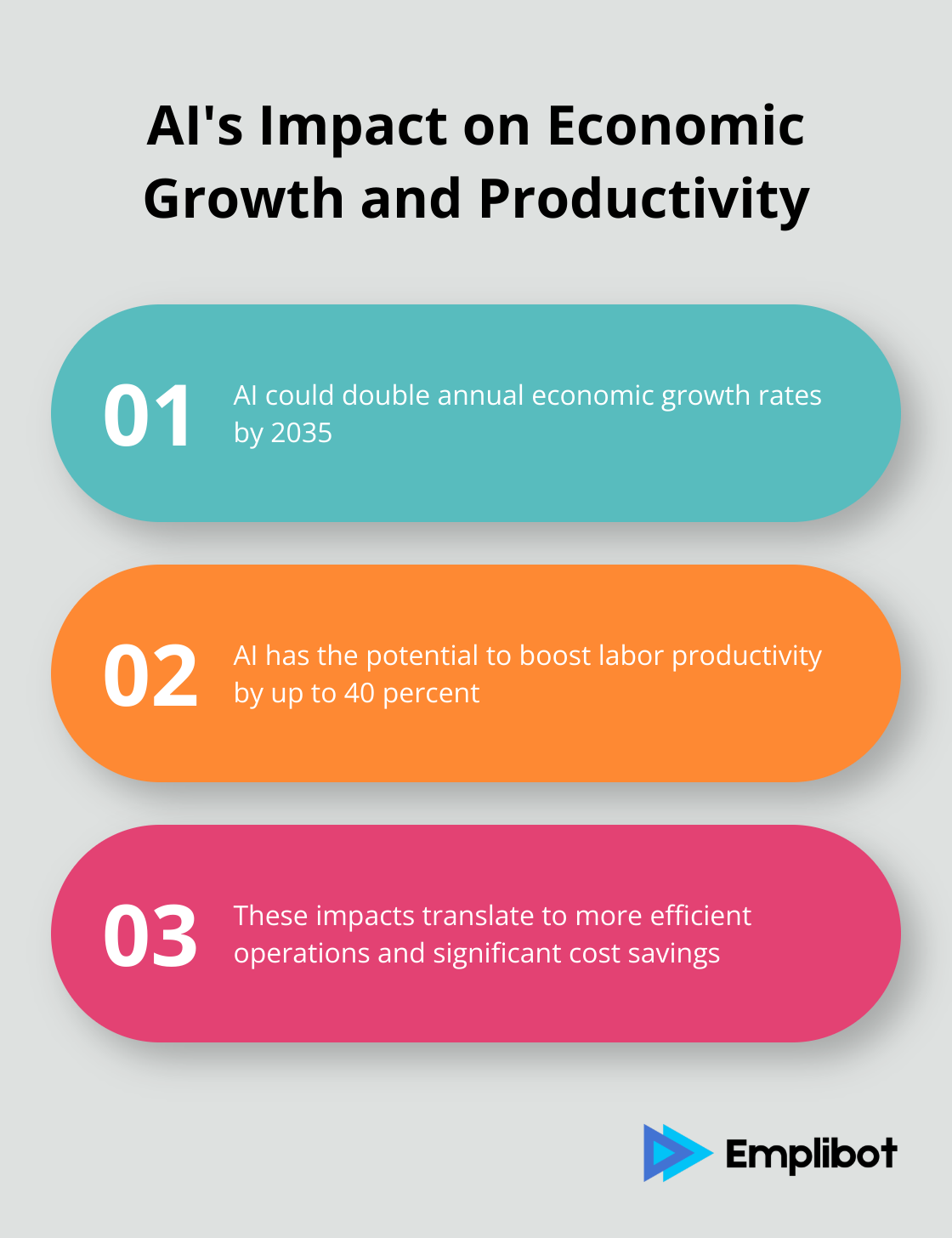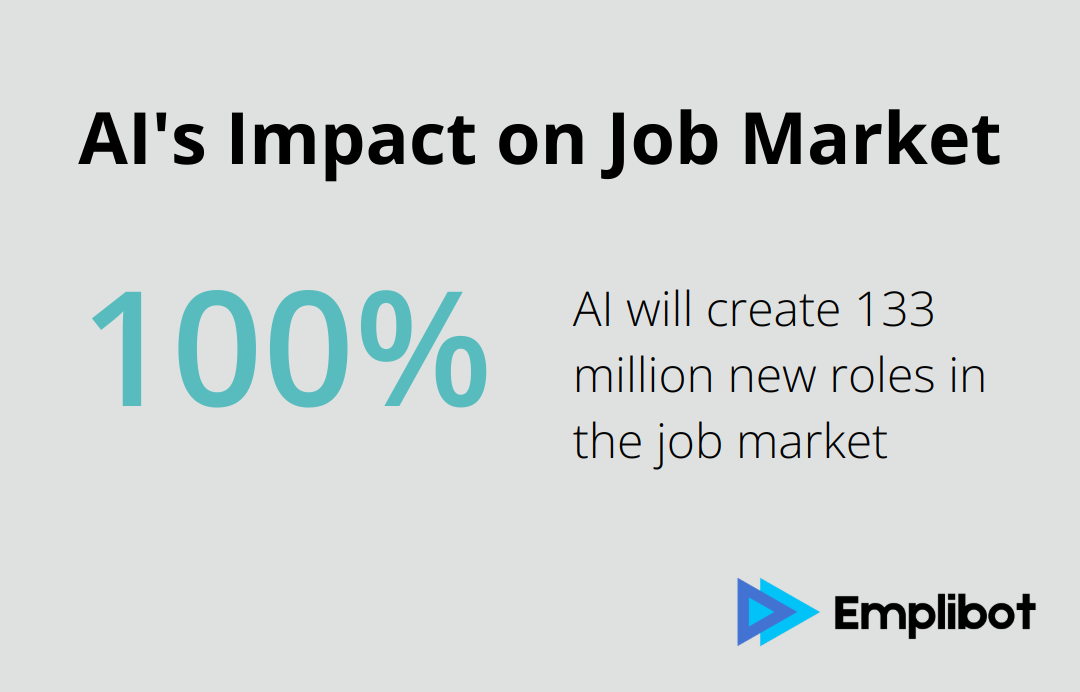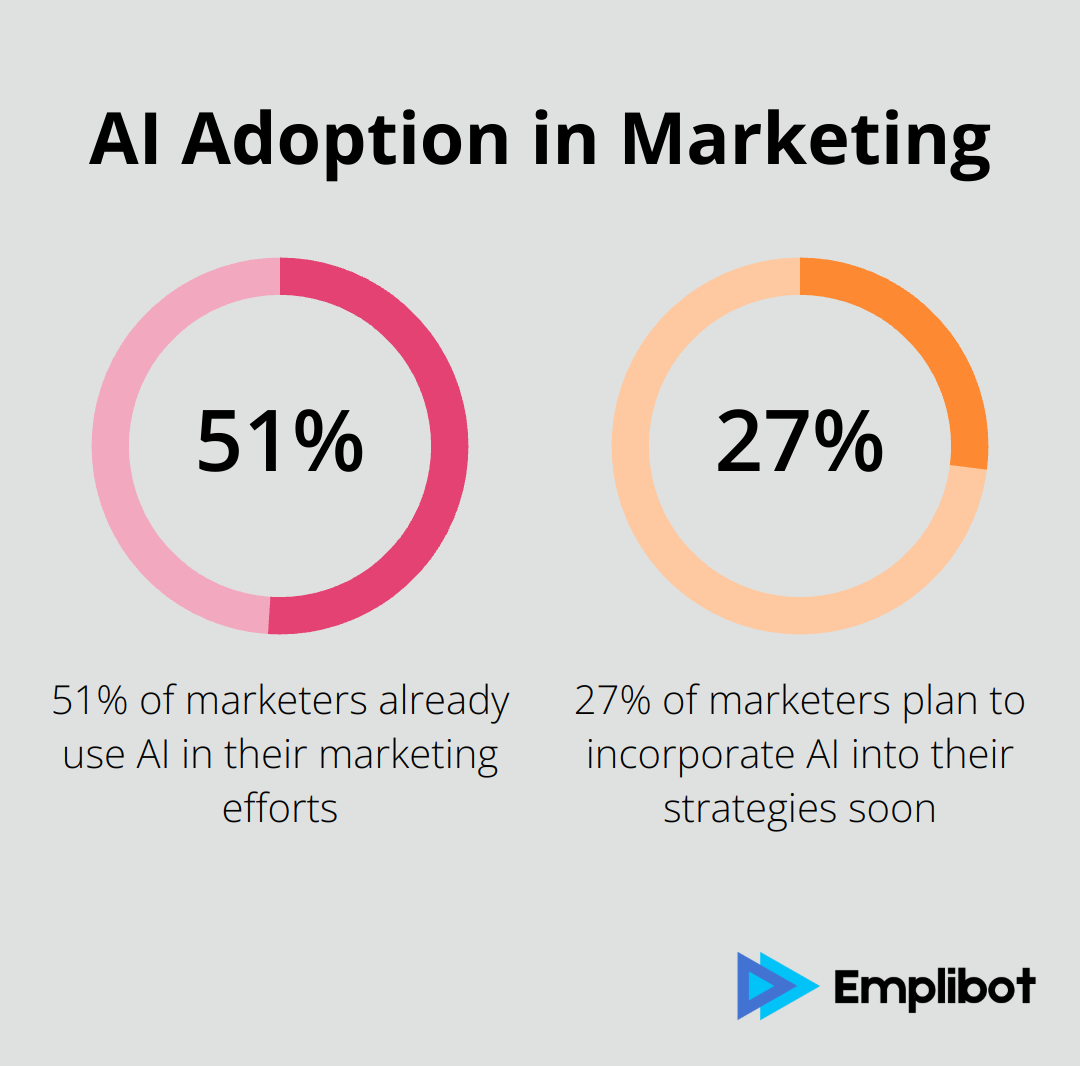AI business automation is transforming the way companies operate. At Emplibot, we’ve seen firsthand how this technology streamlines processes, cuts costs, and boosts productivity across industries.
In this post, we’ll show you practical ways to implement AI automation in your business, from customer service to HR. Get ready to learn how AI can revolutionize your operations and give you a competitive edge.
What Is AI Automation?
Defining AI Automation
AI automation transforms business operations by using artificial intelligence to perform tasks that once required human intervention. It combines machine learning algorithms, natural language processing, and data analysis to streamline processes and make decisions.
The Impact of AI Automation
AI automation isn’t just a trendy concept – it’s a powerful tool for businesses. A study by Accenture reveals that AI could double annual economic growth rates by 2035 and boost labor productivity by up to 40 percent. This translates to more efficient operations and significant cost savings.

Dispelling Common Myths
Many business owners worry that AI will replace human workers. This fear is unfounded. AI automation enhances human capabilities rather than replacing them. The World Economic Forum predicts that while AI may displace 75 million jobs, it will create 133 million new roles. AI serves as a tool that empowers employees to focus on higher-value tasks.

Real-World Applications
AI automation benefits businesses of all sizes. Here are some examples:
- A local bakery used AI to optimize inventory management, reducing waste by 25%.
- A law firm implemented AI-powered document review, cutting research time by 70%.
- A manufacturing company saw a 30% reduction in production errors after implementing AI-driven quality control.
Transforming Business Functions
AI automation revolutionizes various aspects of business:
- Customer Service: AI chatbots handle routine inquiries 24/7, tracking responses and gathering customer data.
- Marketing: AI analyzes customer data to create personalized campaigns (increasing conversion rates).
- Sales: AI predicts customer behavior, helping sales teams focus on high-potential leads.
- Operations: AI optimizes supply chains (reducing costs and improving efficiency).
As we explore the potential of AI automation across different business areas, it becomes clear that this technology offers a significant competitive advantage. The next section will provide practical strategies for implementing AI automation in specific business functions, starting with customer service.
How AI Transforms Your Business Operations
AI automation revolutionizes business operations across various departments. This chapter explores how you can leverage AI to enhance efficiency and productivity in key areas of your business.
Elevate Customer Service with AI
AI-powered chatbots and virtual assistants transform customer service. These tools handle a high volume of inquiries simultaneously, providing instant responses 24/7. Conversational AI reduces operational costs and increases profitability by automating repetitive tasks, providing 24/7 support, and handling a large number of customer inquiries.
A major e-commerce platform reduced their response time from 24 hours to just 5 minutes after implementing an AI chatbot. This improved customer satisfaction and allowed human agents to focus on more complex issues.
To implement AI in your customer service:
- Identify common customer queries
- Train your AI system with relevant data
- Integrate the AI chatbot with your existing customer service platforms
- Monitor and improve the AI’s performance based on customer feedback
Supercharge Marketing with AI Tools
AI is a game-changer in marketing, enabling personalized campaigns at scale. AI-powered tools analyze vast amounts of customer data to predict behavior, optimize ad spend, and create tailored content.
A Salesforce study found that 51% of marketers already use AI, with 27% planning to incorporate it soon. These marketers report significant improvements in personalization, customer segmentation, and campaign performance.

To leverage AI in your marketing efforts:
- Use AI-powered analytics tools to gain deeper insights into customer behavior
- Implement AI-driven content creation tools for personalized email campaigns
- Utilize predictive analytics to optimize ad targeting and budget allocation
- Employ AI-powered social media management tools for better engagement
Streamline Sales Processes with AI
AI revolutionizes sales by automating repetitive tasks and providing valuable insights. AI algorithms analyze customer data to identify high-potential leads, predict customer needs, and personalize sales pitches.
Generative AI’s impact on productivity could add trillions of dollars in value to the global economy-and the era is just beginning.
To integrate AI into your sales process:
- Implement AI-powered CRM systems for better lead scoring and prioritization
- Use AI chatbots for initial lead qualification
- Leverage predictive analytics to forecast sales and identify upselling opportunities
- Employ AI-driven tools for personalized email follow-ups and scheduling
Transform HR and Recruitment with AI
AI streamlines HR processes, from recruitment to employee engagement. AI-powered tools screen resumes, conduct initial interviews, and even predict employee turnover.
A study by Ideal reports that companies using AI in recruitment see a 75% reduction in time-to-hire and a 35% decrease in turnover rates.
To harness AI in your HR department:
- Use AI-powered applicant tracking systems for efficient resume screening
- Implement chatbots for initial candidate interactions and scheduling
- Utilize AI analytics for performance evaluation and employee engagement tracking
- Employ AI-driven tools for personalized learning and development programs
These AI automation strategies can significantly enhance your business operations across multiple departments. The next chapter will guide you through the process of implementing AI automation in your business, ensuring a smooth transition and maximum benefits.
How to Implement AI Automation in Your Business
Assess Your Automation Needs
Start with a comprehensive audit of your business processes. Identify tasks that are repetitive, time-consuming, or prone to human error. These tasks present prime opportunities for AI automation.
Focus on areas such as data entry, customer inquiries, inventory management, and financial reporting. Prioritize processes that, when automated, will have the most significant impact on your bottom line or customer satisfaction.
Choose the Right AI Tools
After you identify your automation opportunities, select the appropriate AI tools. The market offers numerous options, so focus on solutions that align with your specific needs and integrate well with your existing systems.
Consider tools like:
- Salesforce Einstein for sales and CRM automation
- UiPath for robotic process automation
- IBM Watson for advanced analytics and decision-making
Evaluate factors such as scalability, ease of use, and customer support when selecting your AI tools. For content creation and distribution, Emplibot stands out as a top choice, automating the entire content marketing process from keyword research to social media posting.
Plan Your Integration Strategy
Successful integration of AI automation requires careful planning and execution. Begin with a pilot project in a non-critical area of your business. This approach allows you to test the technology, identify potential issues, and build confidence in the system.
Ensure you have clean, high-quality data to feed your AI systems. Invest time in data preparation to maximize the effectiveness of your AI tools.
Develop clear metrics to measure the success of your AI implementation. These metrics could include time saved, error reduction rates, or improvements in customer satisfaction scores.
Prepare Your Team for AI Integration
The human element plays a crucial role in successful AI implementation. Communicate openly with your employees about the changes AI will bring. Address concerns and highlight how AI will enhance their work rather than replace them.
Provide comprehensive training on the new AI tools. A PwC study found that 74% of employees are ready to learn new skills to remain employable in the AI era. Tap into this enthusiasm and empower your team to work alongside AI effectively.
Create a culture of continuous learning and adaptation. As AI technologies evolve, your team should be prepared to evolve with them.
Final Thoughts
AI business automation reshapes the corporate landscape, offering unprecedented opportunities for efficiency, growth, and innovation. Companies that implement AI-driven solutions streamline operations, enhance customer experiences, and gain a competitive edge in today’s fast-paced market. The benefits of AI automation include reduced costs, increased productivity, and improved decision-making.
AI transforms every aspect of business operations, from customer service chatbots to predictive analytics in sales. As AI technology evolves, businesses must stay informed and adapt to avoid falling behind their more tech-savvy competitors. The future will likely bring more advanced AI applications, including sophisticated machine learning algorithms and improved natural language processing.
Emplibot offers a comprehensive solution for businesses looking to start their AI automation journey. It automates content creation and distribution, helping businesses increase their online presence, generate leads, and boost sales without extensive manual effort. Successful AI implementation requires investment in team training and fostering a culture of innovation to prepare for the AI-driven future.

